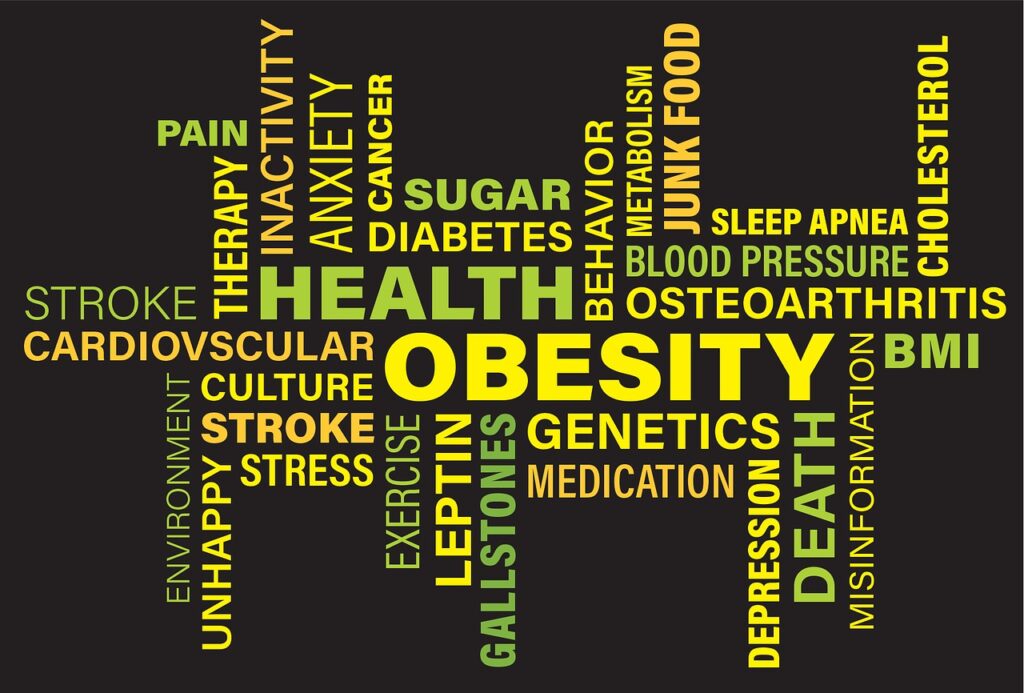Do yOu know ?

Obesity is expected to have a global economic impact of $2 trillion each year. Therefore, it is comparable to the impact of smoking and armed violence.
What is Obesity ?
Obesity is a medical disorder that presents serious health hazards due to excessive buildup of body fat. It is defined as having a Body Mass Index (BMI) of 30 or higher which is the standard method of measuring any obese person.
This illness raises the risk of major health problems like type 2 diabetes, heart disease, hypertension, several malignancies, and psychological disorders like anxiety and depression.
For more authentic information, click here.
Causes

Having a thorough understanding of the mentioned reasons can aid in creating management and preventative plans that work:
1. Diet and Nutrition
- High-Calorie Intake: Gaining weight is the result of consuming more calories than the body requires, especially from foods high in fat and sugar.
- Unhealthy Eating Habits: Eating fast food, sweetened beverages, and snacks on a regular basis increases the amount of calories consumed and depletes nutrition.
2. Sedentary Lifestyle
- Physical Inactivity: Extended periods of sitting, for any instance at home, at work, or in school, lower the amount of calories burned.
- Lack of Exercise: Weight increase results from insufficient physical activity and cannot counteract calorie intake.
3. Genetics and Family History
- Genetic Predisposition: A person’s body’s ability to store fat and use energy can be influenced by genetics. Obesity runs in families, so there is a higher risk of the disease in those individuals.
- Metabolic Rate: Genetics can affect hunger, metabolic rate, and the way the body breaks down food.
4. Environmental Factors
- Urbanization: Sedentary lifestyles and easy availability to unhealthy food options are common in urban contexts.
- Socioeconomic level: Because of restricted access to healthful foods, recreational opportunities, and health education, obesity rates are higher in areas with lower socioeconomic level.
5. Psychological Factors
- Emotional Eating: Stress, boredom, and sadness might cause some people to eat more.
- Mental Health Disorders: Disorders such as anxiety and depression can cause weight gain and decreased exercise.
6. Medical Conditions and Medications
- Health Conditions: A number of illnesses, including Cushing’s syndrome, PCOS, and hypothyroidism, can cause weight gain.
- Medications: Weight gain is a possible side effect of some drugs, including corticosteroids, antipsychotics, and antidepressants.
7. Behavioral and Social Factors
- Poor Sleep: Hormonal imbalances that heighten appetite are caused by inadequate sleep, and this is linked to weight gain.
- Cultural Influences: Eating patterns, attitudes toward food, and body weight can all be influenced by cultural customs and conventions.
Health implications

1. Chronic Diseases: Type 2 diabetes, heart disease, stroke, and several types of cancer are among the major disorders that raises the risk of developing.
2. Cardiovascular Problems: Obesity raises the risk of heart attacks and strokes by causing high blood pressure, atherosclerosis, and high cholesterol.
3. Metabolic Disorders: Diabetes and insulin resistance are caused, which also affects glucose metabolism and insulin production.
4. Joint discomfort and Mobility Issues: Carrying too much weight strains joints, which can result in arthritis, back discomfort, and decreased range of motion.
Management and Prevention

This disease is prevented and managed with a mix of dietary adjustments, physical activity, and, in certain instances, from medicinal interventions. So, these are as follows:
2. Regular Exercise: At least 150 minutes a week of consistent physical activity, such as aerobic, strength, and flexibility activities.
3. Behavioral Changes: Getting help from medical professionals or support groups to set reasonable objectives, monitor progress, and make long-lasting lifestyle adjustments.
4. Medical Interventions: Under physician supervision, medicines prescribed for weight loss, bariatric surgery, or other medical therapies may be considered in extreme circumstances.
5. Addressing Underlying Factors: determining and resolving underlying causes of obesity, such as psychiatric disorders, medical illnesses, or genetic predispositions.
Click here to access our effective diet plans.
Some Myth Busters regarding Obesity

Conclusion
Finally, combating obesity requires a multidimensional approach that includes-
- Treatments at the individual, community, and policy levels.
- Encouraging healthier eating habits, increasing physical exercise.
- Providing access to nutritional foods.
- Education and support networks to promote long-term lifestyle changes.
- Additionally, government initiatives aiming at regulating food sectors and ensuring healthier surroundings.
We can pave the way for a healthier future by working together and taking collective action.
Very crucial blog .. thank you so much for guiding us against the myths .. it was much needed !